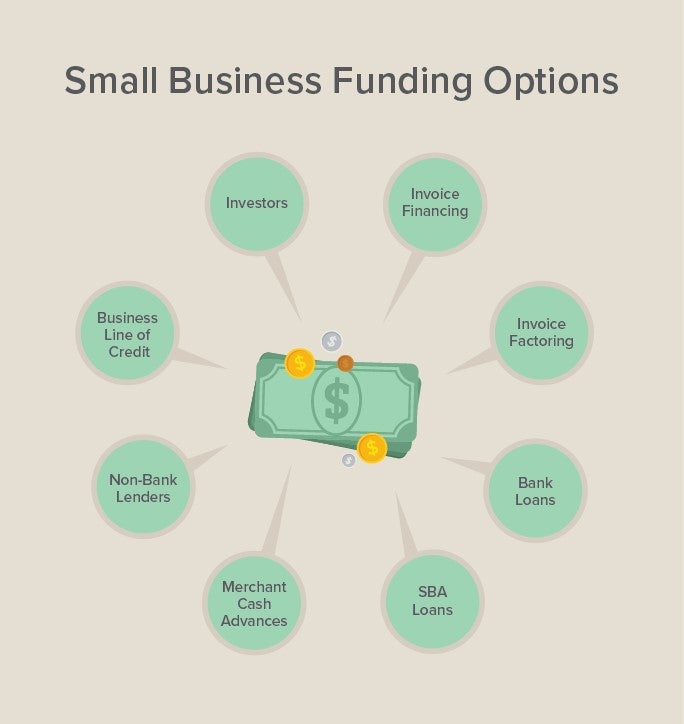
If small business owners had it their way, they’d never have to worry about money. Their bank accounts would always give them the financial flexibility necessary to pursue any and all opportunities for growth. Unfortunately, it’s not that simple.
According to a recent study, more than 60% of small business owners worry about their cash flow situation every month.
There are a number of reasons why cash can get tight for small businesses, including the following:
- Customers couldtake their time paying their bills.
- Operating expenses (rent, supplies and utilities) can increase.
- Sales could slow down unexpectedly.
- New equipment and technology may need to be purchased.
- Health care costs could eat even more profit.
The good news is that while cash flow problems are common for small businesses, they don’t have to be a death sentence. When money’s tight, there are a number of outside financing options that small business owners can turn to in order to bridge cash flow gaps and redirect their focus on growing their companies. Let’s take a look at eight of them.
1. Invoice Financing
Some small business owners struggle to pay their bills despite the fact they have a lot of outstanding invoices piling up. Instead of taking on unnecessary debt, small business owners can opt to use an invoice financing service like Fundbox to get advance payments on the bills customers haven’t paid yet. Invoice financing services are easy to use. Business owners simply need to create an account and link it with their bookkeeping app. Once that’s done, they can start clearing invoices from any connected device. The full value of the invoices they select will be deposited into their bank accounts within one or two business days. Depending on the repayment schedule they choose, small business owners will then have 12 or 24 weeks to repay the invoice plus a small fee—though Fundbox will waive all the remaining fees if you repay early.
2. Invoice Factoring
Small business owners can also opt to sell their outstanding invoices at a discount to a factoring company. The factoring company gives the small business a lump sum of cash, which is only a percentage of the full invoice value. Factoring companies take ownership of their clients’ receivables—which means they collect checks directly from customers. Because factoring is often a sign of cash flow problems, this might not be the best look for many companies. Factoring is also considered one of the more expensive forms of financing. Small business owners that choose this route need to make sure they read the fine print because factoring companies are known to charge hidden fees.
3. Traditional Bank Loans
It used to be that small business owners who needed a loan could walk into the neighborhood bank, shake someone’s hand and start investing their money shortly thereafter. As the Wall Street Journal points out; however, traditional financial institutions are approving fewer and fewer small business loan applications in the wake of the recent financial crisis. The lucky applicants who get approved will likely enjoy favorable interest rates. Still, the process to secure a traditional bank loan is extremely complex and time-consuming. It might take as long as two months before a small business gets funded. Beyond that, banks typically require borrowers to put up collateral (property or equipment). In the event a borrower is unable to repay their loan, the bank takes ownership of the collateral to recoup its costs. Banks prefer to lend money to businesses that have near-perfect credit scores and very strong financials. If you’re not in that category, you should probably look somewhere else.
4. Small Business Administration (SBA) Loans
Small business owners can also apply for a government-backed loan from an approved SBA lender. Unlike other forms of financing, these loans are available to businesses that are just opening their doors. It is, however, exceptionally difficult to secure an SBA loan. Small business owners need to submit mountains of paperwork and have strong credit to qualify for this competitive form of financing. Just like traditional bank loans, SBA loans also require a personal guarantee. It’s worth noting that SBA loans often have higher interest rates than bank loans. Lenders know that they’ll still get paid even if a borrower’s business goes under.
5. Merchant Cash Advances
Small businesses that process a heavy volume of credit card transactions—like retail stores or restaurants—can use merchant cash advances to solve their money problems. Here’s how they work: A company will advance a small business a sum of money ($80,000) and take a slice of its credit card receipts (10%) until the loan and whatever fees they charge are repaid. Because repayment is proportional to revenue, small business owners won’t have to worry about being unable to cover an installment if sales dip unexpectedly. At the same time, they may have trouble covering other operating costs during slow periods. Merchant cash advances are known to be a costly form of financing.
6. Business Lines of Credit
Small business owners can also apply for a business line of credit, which is essentially a company credit card. Over time, businesses can rebuild their credit scores by steadily repaying their bills each month. If a company is having cash flow problems, though, a business line of credit probably isn’t the best financing option. The last thing a small business owner wants is to use up their entire line of credit and not have any money left to pay it back. Like their consumer credit card peers, business line of credit lenders are often known to levy hefty fees on delinquent accounts.
7. Loans From Non-Bank Lenders
Because banks are hesitant to loan money to small businesses, a number of alternative non-bank lenders have emerged to fill the void. In fact, the Wall Street Journal reports that small business loans from alternative lenders grew 60% between 2014 and 2015. Unlike traditional bank loans, non-bank lenders offer borrowers a streamlined application process. If approved, money can be in a small business owner’s hands within 24 hours. Non-bank lenders don’t require borrowers to have superior credit scores, and no collateral is needed to secure a loan either. For these reasons, this type of funding often carries heavy interest rates.
8. Outside Investors
Small business owners can also decide to sell equity to angel investors or venture capitalists (VCs). In exchange for giving up a certain level of control over the company—as well as a slice of its profits—small business owners may find that talking on an outside investor will help solve cash flow problems. Those who pursue this route need to understand that angels and VCs expect hefty returns. These investors may challenge a lot of a small business owners’ ideas and decisions.
There’s no sense in letting cash flow problems sink your business when the financial lifeline you’re looking for is within reach. Now that you are familiar with the various funding options that are available for your small business, it’s time research lenders to see which one makes the most sense for your specific situation. With money in your hand, you’ll be able to stop worrying about your cash flow and start focusing on what matters most: serving your customers as best you can and growing your business. Good luck!
Is small business funding a lightning rod for you? If so, share your two cents on the topic in the comments below.
 Author: As VP of Business Development at Fundbox, Johnson Ma manages partner relationships as well as partnership strategy. Prior to Fundbox, Johnson led business development and strategy for Yub (acquired by Quotient Technology Inc.) and oversaw business development and marketing at TrialPay (acquired by Visa, Inc.) Johnson received a BA in Economics with highest honors from UC Berkeley.
Author: As VP of Business Development at Fundbox, Johnson Ma manages partner relationships as well as partnership strategy. Prior to Fundbox, Johnson led business development and strategy for Yub (acquired by Quotient Technology Inc.) and oversaw business development and marketing at TrialPay (acquired by Visa, Inc.) Johnson received a BA in Economics with highest honors from UC Berkeley.













